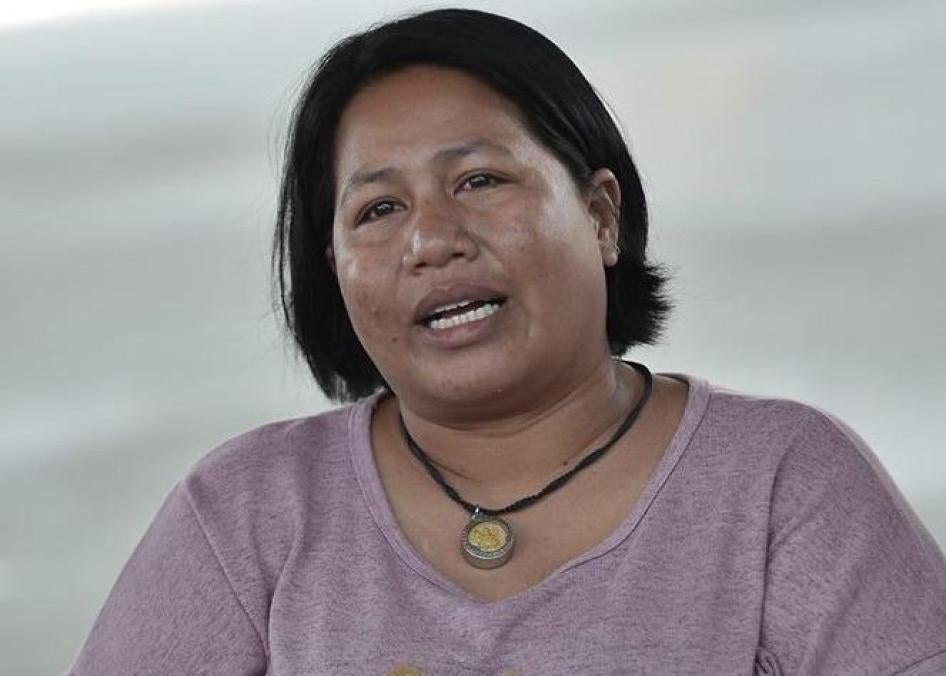(New York) – The Thai military junta brought “insulting the monarchy” charges against the mother of a pro-democracy activist for her response to an allegedly unlawful Facebook message, Human Rights Watch said today.
On May 6, 2016, the ruling National Council for Peace and Order (NCPO) accused Patnaree Chankij, 40, of lese majeste under article 112 of the Penal Code and of “computer crime” under the 2007 Act on Computer Crime for failing to criticize or take other action against Burin Intin, a friend of her son, who sent her Facebook messages containing alleged lese majeste comments. Burin was arrested on April 27 for posting Facebook commentary that Thai authorities considered to be offensive to the monarchy.
“The Thai junta has sunk to a new low by charging an activist’s mother under the ‘insulting the monarchy’ law, which has been systematically abused to silence critics,” said Brad Adams, Asia director at Human Rights Watch. “Prosecuting someone for her vague response to a Facebook message is just the junta’s latest outrageous twist of the lese majeste law.”
Patnaree’s request for bail was denied on the basis that she is being accused of a “serious crime.” She will be brought before the Bangkok Military Court on May 9, and if found guilty, could face up to 15 years in prison for each offense.
Patnaree’s son, Sirawith Seritiwat, is a prominent student activist with Resistant Citizen and the New Democracy Movement, groups which the authorities have regularly targeted because of his pro-democracy activities.
The charges against Patnaree state that she received alleged lese majeste messages from Burin, who then wrote, “Don’t criticize me for saying all these.” Patnaree merely acknowledged the email by writing “Ja,” a non-committal, colloquial “yes” in the Thai language. The authorities charged her both for violating article 112 and for being an accomplice to Burin.
Criticizing the monarchy in any form can be a serious criminal offense in Thailand. The military junta has arbitrarily and aggressively used the lese majeste laws to prosecute people for any speech they deem to be critical of the monarchy, Human Rights Watch said. The junta leader, Prime Minister Gen. Prayut Chan-ocha, has made lese majeste prosecutions a top priority for his government. Since the coup in May 2014, 57 lese majeste cases have been brought, with 44 of these against individuals for online commentary.
Article 112 of Thailand’s Penal Code states that, “whoever defames, insults or threatens the King, Queen, Heir-Apparent or Regent shall be punished with imprisonment of three to fifteen years.” In recent years the government and the courts have interpreted the law in an increasingly broad and arbitrary fashion. On December 14, 2015, based on a complaint made by Thai military authorities, police filed lese majeste charges against Thanakorn Siripaiboon in the Bangkok Military Court for spreading Facebook images and comments that were deemed to mock the king’s pet dog.
The United Nations special rapporteur on freedom of expression stated in October 2011 that Thailand’s lese majeste laws were “vague and overly broad, and the harsh criminal sanctions are neither necessary nor proportionate to protect the monarchy or national security.”
Military courts have imposed much harsher sentences for lese majeste offenses than civilian courts did prior to the coup. In August 2015, the Bangkok Military Court sentenced Pongsak Sriboonpeng to 60 years in prison for his alleged lese majeste Facebook postings (which were later reduced to 30 years when he pleaded guilty). It was the longest recorded sentence for lese majeste in Thailand’s history.
Neither the Thai monarch, King Bhumibol Adulyadej, nor any member of the royal family has ever personally filed lese majeste charges. During his birthday speech in 2005, King Bhumibol stated that he was not above criticism. “Actually, I must also be criticized. I am not afraid if the criticism concerns what I do wrong, because then I know. Because if you say the king cannot be criticized, it means that the king is not human,” he said. “If the king can do no wrong, it is akin to looking down upon him because the king is not being treated as a human being. But the king can do wrong.”
The police, public prosecutors, courts, and other state authorities appear reluctant to reject any allegations of lese majeste because of concern that any failure to act might be considered to indicate disloyalty to the monarchy.
“In the name of protecting the monarchy, the junta is tightening a chokehold on free expression and heightening a climate of fear across Thailand,” Adams said. “The arbitrary enforcement of the lese majeste law against an activist’s mother is yet another example of Thailand’s blatant contempt of its human rights obligations.”






